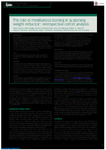The role of mindfulness training in sustaining weight reduction: retrospective cohort analysis
| dc.contributor.author | Hanson, P | |
| dc.contributor.author | Lange, M | |
| dc.contributor.author | Oduro-Donkor, D | |
| dc.contributor.author | Shuttlewood, E | |
| dc.contributor.author | Weickert, MO | |
| dc.contributor.author | Randeva, HS | |
| dc.contributor.author | Menon, V | |
| dc.contributor.author | Alexander, R | |
| dc.contributor.author | Basset, P | |
| dc.contributor.author | Shankar, Rohit | |
| dc.contributor.author | Barber, TM | |
| dc.date.accessioned | 2022-11-16T11:02:52Z | |
| dc.date.available | 2022-11-16T11:02:52Z | |
| dc.date.issued | 2022-11 | |
| dc.identifier.issn | 2056-4724 | |
| dc.identifier.issn | 2056-4724 | |
| dc.identifier.other | e198 | |
| dc.identifier.uri | http://hdl.handle.net/10026.1/19979 | |
| dc.description.abstract |
<jats:sec id="S2056472422006020_sec_a1"> <jats:title>Background</jats:title> <jats:p>Psychological stress has an established bi-directional relationship with obesity. Mindfulness techniques reduce stress and improve eating behaviours, but their long-term impact remains untested. CALMPOD (Compassionate Approach to Living Mindfully for Prevention of Disease) is a psychoeducational mindfulness-based course evidenced to improve eating patterns across a 6-month period, possibly by reducing stress. However, no long-term evaluation of impact exists.</jats:p> </jats:sec> <jats:sec id="S2056472422006020_sec_a2"> <jats:title>Aims</jats:title> <jats:p>This study retrospectively evaluates 2-year outcomes of CALMPOD on patient engagement, weight and metabolic markers.</jats:p> </jats:sec> <jats:sec id="S2056472422006020_sec_a3" sec-type="methods"> <jats:title>Method</jats:title> <jats:p>All adults with a body mass index >35 kg/m<jats:sup>2</jats:sup> attending an UK obesity service during 2016–2020 were offered CALMPOD. Those who refused CALMPOD were offered standard lifestyle advice. Routine clinic data over 2 years, including age, gender, 6-monthly appointment attendance, weight, haemoglobin A1C and total cholesterol, were pooled and analysed to evaluate CALMPOD.</jats:p> </jats:sec> <jats:sec id="S2056472422006020_sec_a4" sec-type="results"> <jats:title>Results</jats:title> <jats:p>Of 289 patients, 163 participated in the CALMPOD course and 126 did not. No baseline demographic differences existed between the participating and non-participating groups. The CALMPOD group had improved attendance across all 6-monthly appointments compared with the non-CALMPOD group (<jats:italic>P</jats:italic> < 0.05). Mean body weight reduction at 2 years was 5.6 kg (s.d. 11.2, <jats:italic>P</jats:italic> < 0.001) for the CALMPOD group compared with 3.9 kg (s.d. 10.5, <jats:italic>P</jats:italic> < 0.001) for the non-CALMPOD group. No differences in haemoglobin A1C and fasting serum total cholesterol were identified between the groups.</jats:p> </jats:sec> <jats:sec id="S2056472422006020_sec_a5" sec-type="conclusions"> <jats:title>Conclusions</jats:title> <jats:p>The retrospective evaluation of CALMPOD suggests potential for mindfulness and compassion-based group educational techniques to improve longer-term patient and clinical outcomes. Prospective large-scale studies are needed to evaluate the impact of stress on obesity and the true impact of CALMPOD.</jats:p> </jats:sec> | |
| dc.format.extent | e198- | |
| dc.format.medium | Electronic | |
| dc.language | en | |
| dc.language.iso | en | |
| dc.publisher | Royal College of Psychiatrists | |
| dc.subject | Complimentary therapies | |
| dc.subject | education and training | |
| dc.subject | psychosocial interventions | |
| dc.subject | cognitive behavioural therapies | |
| dc.subject | outcome studies | |
| dc.title | The role of mindfulness training in sustaining weight reduction: retrospective cohort analysis | |
| dc.type | journal-article | |
| dc.type | Journal Article | |
| plymouth.author-url | https://www.webofscience.com/api/gateway?GWVersion=2&SrcApp=PARTNER_APP&SrcAuth=LinksAMR&KeyUT=WOS:000883327300001&DestLinkType=FullRecord&DestApp=ALL_WOS&UsrCustomerID=11bb513d99f797142bcfeffcc58ea008 | |
| plymouth.issue | 6 | |
| plymouth.volume | 8 | |
| plymouth.publication-status | Published | |
| plymouth.journal | BJPsych Open | |
| dc.identifier.doi | 10.1192/bjo.2022.602 | |
| plymouth.organisational-group | /Plymouth | |
| plymouth.organisational-group | /Plymouth/Faculty of Health | |
| plymouth.organisational-group | /Plymouth/Users by role | |
| dc.publisher.place | England | |
| dc.identifier.eissn | 2056-4724 | |
| dc.rights.embargoperiod | Not known | |
| rioxxterms.versionofrecord | 10.1192/bjo.2022.602 | |
| rioxxterms.licenseref.uri | http://www.rioxx.net/licenses/all-rights-reserved | |
| rioxxterms.type | Journal Article/Review |


